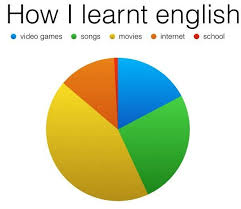Source: http://englishwithatwist.com/ShanthiBlog/2013/10/07/5-tips-on-how-to-immerse-yourself-in-english-every-day/
 Some
of you may be aware that apart from my online courses, I also teach
General and Business English to adults who come to London on intensive
courses of between one to three weeks. These clients want to have the
full-immersion experience of language learning.
Some
of you may be aware that apart from my online courses, I also teach
General and Business English to adults who come to London on intensive
courses of between one to three weeks. These clients want to have the
full-immersion experience of language learning.
There’s no doubt that immersing yourself in the language you’re learning by spending time in the country will improve your fluency skills immeasurably. Not only will it improve your language skills, it will also give you the cultural context of the language. Listening to spoken English in the classroom is totally different to listening to it on the streets of London.
Although my clients are here for what is relatively a short time in terms of the time required to learn a language, they do see a significant improvement during that period. However, no matter how good the improvement I am always asked the same question at the end of every course: “What can I do to maintain/improve my language skills when I go back home?” In other words, how can I ‘immerse’ myself in English back home?
I’d like to share with you the 5 tips I give my clients on how they can immerse themselves in English.
Tip 1. A Little Every Day
It might come as no surprise to you but learning any language takes practice. The more regularly you practise the language the better you’ll improve. The best way of getting this practice is to fit it in your daily routine.

A little a day is much more effective and sustainable than finding blocks of time every week. If you can only afford 20 – 30 minutes a day, that’s absolutely fine. Block that time off in your diary. That way it becomes part of your daily schedule and more difficult to ignore.
 Tip 2. Own Your Learning!
Tip 2. Own Your Learning!
Choose what you’re interested in. If reading books is not your thing, don’t try to read a book in English. It will never last! If you love football, immerse yourself in the world of football by looking up sports articles in English, watching football matches in English or listening to sports broadcasts like BBC Radio 5.
Tip 3. Read Online Magazines, Newspapers or Blogs
There is so much available online now that it makes immersing yourself in English much easier and more accessible than ever. If you don’t have much time each day, online magazines and newspaper articles are a quick and effective way of giving you your daily dose of English. Once again choose subjects you’re interested in.
Tip 4. Watch TV Shows or Films
There are so many TV shows that are streamed and on demand now on the internet that you are spoilt for choice. One of my clients loves the British programme “Top Gear” as he loves anything to do with cars. He has learned many British English expressions that he would not have otherwise heard.
I have an extensive DVD library of films in English which I encourage my clients to watch when they stay with me. I always tell them to watch them with the English subtitles on. Back home, you can do the same with films that you can download from iTunes, Netflix or other sources.
 If you don’t have time to watch TV shows or films, another wonderful resource is TED Talks.
TED Talks is a series of wonderfully captivating video presentations
given by the world’s leading specialists on a variety of topics. These
presentations last between 3 – 18 minutes and therefore could suit
anyone’s busy schedule.
If you don’t have time to watch TV shows or films, another wonderful resource is TED Talks.
TED Talks is a series of wonderfully captivating video presentations
given by the world’s leading specialists on a variety of topics. These
presentations last between 3 – 18 minutes and therefore could suit
anyone’s busy schedule.
Here is a blog extolling the virtues of TED Talks by one of my fellow English Language Trainers. Thank you, Justin!
Tip 5. Listen to Music/ Podcasts
I’ve written before about how songs are a wonderful way of practising your English and listening skills. So if you enjoy listening to songs in English your daily dose of English lyrics will do you no harm!
If, however, you’re like me and prefer to listen to spoken radio programmes, then podcasts are a wonderful way of accessing them. You can download the podcasts to your MP3 player and listen to them anytime and anywhere you want. You can do it whilst you’re exercising or driving. The BBC World Service has a good selection.
Whatever you choose, the most important thing to remember is to make your immersion experience fun, practical and convenient.
Ciao for now
Shanthi
PS I’d like to thank Kirsten Winkler for giving me the idea for this post. Her post got me thinking.
If you liked this article, please share it. If you’d like to receive my posts via email, why not subscribe to my blog?
5 Tips on How To Immerse Yourself in English Every Day
 Some
of you may be aware that apart from my online courses, I also teach
General and Business English to adults who come to London on intensive
courses of between one to three weeks. These clients want to have the
full-immersion experience of language learning.
Some
of you may be aware that apart from my online courses, I also teach
General and Business English to adults who come to London on intensive
courses of between one to three weeks. These clients want to have the
full-immersion experience of language learning.There’s no doubt that immersing yourself in the language you’re learning by spending time in the country will improve your fluency skills immeasurably. Not only will it improve your language skills, it will also give you the cultural context of the language. Listening to spoken English in the classroom is totally different to listening to it on the streets of London.
Although my clients are here for what is relatively a short time in terms of the time required to learn a language, they do see a significant improvement during that period. However, no matter how good the improvement I am always asked the same question at the end of every course: “What can I do to maintain/improve my language skills when I go back home?” In other words, how can I ‘immerse’ myself in English back home?
I’d like to share with you the 5 tips I give my clients on how they can immerse themselves in English.
Tip 1. A Little Every Day
It might come as no surprise to you but learning any language takes practice. The more regularly you practise the language the better you’ll improve. The best way of getting this practice is to fit it in your daily routine.

A little a day is much more effective and sustainable than finding blocks of time every week. If you can only afford 20 – 30 minutes a day, that’s absolutely fine. Block that time off in your diary. That way it becomes part of your daily schedule and more difficult to ignore.
 Tip 2. Own Your Learning!
Tip 2. Own Your Learning!Choose what you’re interested in. If reading books is not your thing, don’t try to read a book in English. It will never last! If you love football, immerse yourself in the world of football by looking up sports articles in English, watching football matches in English or listening to sports broadcasts like BBC Radio 5.
Tip 3. Read Online Magazines, Newspapers or Blogs
There is so much available online now that it makes immersing yourself in English much easier and more accessible than ever. If you don’t have much time each day, online magazines and newspaper articles are a quick and effective way of giving you your daily dose of English. Once again choose subjects you’re interested in.
Tip 4. Watch TV Shows or Films
There are so many TV shows that are streamed and on demand now on the internet that you are spoilt for choice. One of my clients loves the British programme “Top Gear” as he loves anything to do with cars. He has learned many British English expressions that he would not have otherwise heard.
I have an extensive DVD library of films in English which I encourage my clients to watch when they stay with me. I always tell them to watch them with the English subtitles on. Back home, you can do the same with films that you can download from iTunes, Netflix or other sources.
 If you don’t have time to watch TV shows or films, another wonderful resource is TED Talks.
TED Talks is a series of wonderfully captivating video presentations
given by the world’s leading specialists on a variety of topics. These
presentations last between 3 – 18 minutes and therefore could suit
anyone’s busy schedule.
If you don’t have time to watch TV shows or films, another wonderful resource is TED Talks.
TED Talks is a series of wonderfully captivating video presentations
given by the world’s leading specialists on a variety of topics. These
presentations last between 3 – 18 minutes and therefore could suit
anyone’s busy schedule.Here is a blog extolling the virtues of TED Talks by one of my fellow English Language Trainers. Thank you, Justin!
Tip 5. Listen to Music/ Podcasts
I’ve written before about how songs are a wonderful way of practising your English and listening skills. So if you enjoy listening to songs in English your daily dose of English lyrics will do you no harm!
If, however, you’re like me and prefer to listen to spoken radio programmes, then podcasts are a wonderful way of accessing them. You can download the podcasts to your MP3 player and listen to them anytime and anywhere you want. You can do it whilst you’re exercising or driving. The BBC World Service has a good selection.
Whatever you choose, the most important thing to remember is to make your immersion experience fun, practical and convenient.
Ciao for now
Shanthi
PS I’d like to thank Kirsten Winkler for giving me the idea for this post. Her post got me thinking.
If you liked this article, please share it. If you’d like to receive my posts via email, why not subscribe to my blog?



 ‘
to illustrate different regional British accents, although fully
accepting that even a Proficiency group would have difficulties follwing
Jimmy Nail in full flow!
‘
to illustrate different regional British accents, although fully
accepting that even a Proficiency group would have difficulties follwing
Jimmy Nail in full flow! 

 Comment
Comment

 Hello, my name is Richard. You are about to learn the secrets that will
allow you to become fluent in one of the most amazing communication mediums
on the planet, the English language.
Hello, my name is Richard. You are about to learn the secrets that will
allow you to become fluent in one of the most amazing communication mediums
on the planet, the English language.  Anyone can become good at English. You can become good at English. Race
does not matter. Millions of Americans speak fluent English, yet thousands
of them are biologically exactly the same as you. Where you were born does
not matter. Most of the English speakers in the World today learnt English
as a second, or even third language. Even in your country there are many,
many highly proficient English speakers. Where you live does not matter.
Whilst going to live 5 years in Hawaii may make you fluent more quickly,
in this age of the internet, TV and travel it's quite possible to get fluent
at English simply by living at home. Just look at how many foreigner speakers
get along so well here without speaking the local language at all! It's
not where you live, it's how you think.
Anyone can become good at English. You can become good at English. Race
does not matter. Millions of Americans speak fluent English, yet thousands
of them are biologically exactly the same as you. Where you were born does
not matter. Most of the English speakers in the World today learnt English
as a second, or even third language. Even in your country there are many,
many highly proficient English speakers. Where you live does not matter.
Whilst going to live 5 years in Hawaii may make you fluent more quickly,
in this age of the internet, TV and travel it's quite possible to get fluent
at English simply by living at home. Just look at how many foreigner speakers
get along so well here without speaking the local language at all! It's
not where you live, it's how you think. How good do you want to be? Without a goal, however hard you try you will
never achieve anything. You need a decided, specific, written goal. Maybe
you have one already? Maybe you need a certain level of English for a promotion
or pay rise? Maybe there is a special girl or boy you want to speak to
in English? Maybe you have a big business trip coming up? Set that as your
goal. See yourself with that promotion, with that pay rise, with that boy
or girl or talking effortlessly during that business meeting. Set the goal,
work everyday towards it and you will achieve it.
How good do you want to be? Without a goal, however hard you try you will
never achieve anything. You need a decided, specific, written goal. Maybe
you have one already? Maybe you need a certain level of English for a promotion
or pay rise? Maybe there is a special girl or boy you want to speak to
in English? Maybe you have a big business trip coming up? Set that as your
goal. See yourself with that promotion, with that pay rise, with that boy
or girl or talking effortlessly during that business meeting. Set the goal,
work everyday towards it and you will achieve it.  In my first couple of days in a new country I was out drinking with some
English friends. There were some local people in the bar, and naturally
we were keen to meet some of the locals and have a chat and maybe share
a beer or two. We were quite lucky in that one of the guys in the groups
was not only really fun and friendly, he also spoke quite good English
( well, I think the beer helped a little!). When we had finished it was
decided we would go to another bar. So we all got on the train. The shocking
thing was that this fun, friendly, English speaking business man suddenly
told us not to speak English to him on the train. He was embarrassed that
other people may hear him speaking English! Wow.
In my first couple of days in a new country I was out drinking with some
English friends. There were some local people in the bar, and naturally
we were keen to meet some of the locals and have a chat and maybe share
a beer or two. We were quite lucky in that one of the guys in the groups
was not only really fun and friendly, he also spoke quite good English
( well, I think the beer helped a little!). When we had finished it was
decided we would go to another bar. So we all got on the train. The shocking
thing was that this fun, friendly, English speaking business man suddenly
told us not to speak English to him on the train. He was embarrassed that
other people may hear him speaking English! Wow.  We
all start from different points in life. Some of us are born rich, some
are born poor. Some have influential parents, some have no parents at
all. Some have been seemingly been given great chances on a plate, some
have had to work extra hard for everything they have achieved. This is
life. And there's nothing to do but accept it. If we constantly say
"yes, but he was born in America so of course he can speak English", or
"Yes, but he went to the best university and had the best teachers" then
we are blaming other people. Blaming other people is to make excuses,
and making excuses is to open the path to failure. First we must take
responsibility ourselves. How good you are at English is all up to you.
There are millions of people in underdeveloped countries who have no
food, no education and no resources, but they simply decided to learn
English and did it. They took responsibility and took action. You are
exactly the same, if you take responsibility and take action you will
succeed. Maybe you feel you have no time? That you are too busy? But who
decides how you spend your time? Don't blame other people. How you
choose to spend your time is entirely decided by you. So take
responsibility and take control, acknowledge that you control what, when
and how you do things, and make the best use of your time to achieve
your goals. Take time where you can, five minutes after taking the kids
to school? A 20 minute commute to work? An extra 10 minutes while eating
lunch? Your time is yours. Five minutes before breakfast? Your time is
yours. Everything starts with you. You are the master of your destiny,
only you can determine how good you wish to become. Decide today you
wish to be brilliant. Take responsibility. Make it happen. Become a
brilliant speaker.
We
all start from different points in life. Some of us are born rich, some
are born poor. Some have influential parents, some have no parents at
all. Some have been seemingly been given great chances on a plate, some
have had to work extra hard for everything they have achieved. This is
life. And there's nothing to do but accept it. If we constantly say
"yes, but he was born in America so of course he can speak English", or
"Yes, but he went to the best university and had the best teachers" then
we are blaming other people. Blaming other people is to make excuses,
and making excuses is to open the path to failure. First we must take
responsibility ourselves. How good you are at English is all up to you.
There are millions of people in underdeveloped countries who have no
food, no education and no resources, but they simply decided to learn
English and did it. They took responsibility and took action. You are
exactly the same, if you take responsibility and take action you will
succeed. Maybe you feel you have no time? That you are too busy? But who
decides how you spend your time? Don't blame other people. How you
choose to spend your time is entirely decided by you. So take
responsibility and take control, acknowledge that you control what, when
and how you do things, and make the best use of your time to achieve
your goals. Take time where you can, five minutes after taking the kids
to school? A 20 minute commute to work? An extra 10 minutes while eating
lunch? Your time is yours. Five minutes before breakfast? Your time is
yours. Everything starts with you. You are the master of your destiny,
only you can determine how good you wish to become. Decide today you
wish to be brilliant. Take responsibility. Make it happen. Become a
brilliant speaker. Get as many English Language CDs as you can. Listen to them all the time.
"But I'm too busy!" you say, and I quite understand! That's why
I recommend listening to them on your way to work or school, either in
the car or on a portable music player. It's your time, use it. Do it everyday
and you'll soon see how much you can learn.
Get as many English Language CDs as you can. Listen to them all the time.
"But I'm too busy!" you say, and I quite understand! That's why
I recommend listening to them on your way to work or school, either in
the car or on a portable music player. It's your time, use it. Do it everyday
and you'll soon see how much you can learn. One of the biggest shocks that people have about high school English is
that although everyone has studied English at school, hardly anyone speaks
it. I'm sure you had English classes for many years in high school, yes?
And can you speak fluent English? Just imaging if you had studied your
own writing for 6 years in Elementary School and couldn't write a single
word! So why can't you speak English? Well, the reason is that you were
working hard, but not smart. You had the wrong goals and targets in mind.
Up until now the High School English system was built on ideas from the
Victorian period. In that time the target wasn't communication English,
because there was no-one to communicate with! The aim then was to learn
foreign knowledge. People would read books in German or English or Dutch
about arms, or medicine or engineering. They would dissect the grammar
and translate it into for everyone to read and understand. If you think
about your high school English, it was probably something just like that.
And in that respect the world has succeeded. But it's not the Victorian
period anymore, it's now about communication. Unfortunately the school
system hasn't caught up yet, but it will! So realise that what you learnt
in high school won't really help you. But don't feel bad about the time
you spent, you were just working towards an unsuitable goal. And now things
are different, now you have a new goal, a new motivation, and a new determination
to achieve that goal!
One of the biggest shocks that people have about high school English is
that although everyone has studied English at school, hardly anyone speaks
it. I'm sure you had English classes for many years in high school, yes?
And can you speak fluent English? Just imaging if you had studied your
own writing for 6 years in Elementary School and couldn't write a single
word! So why can't you speak English? Well, the reason is that you were
working hard, but not smart. You had the wrong goals and targets in mind.
Up until now the High School English system was built on ideas from the
Victorian period. In that time the target wasn't communication English,
because there was no-one to communicate with! The aim then was to learn
foreign knowledge. People would read books in German or English or Dutch
about arms, or medicine or engineering. They would dissect the grammar
and translate it into for everyone to read and understand. If you think
about your high school English, it was probably something just like that.
And in that respect the world has succeeded. But it's not the Victorian
period anymore, it's now about communication. Unfortunately the school
system hasn't caught up yet, but it will! So realise that what you learnt
in high school won't really help you. But don't feel bad about the time
you spent, you were just working towards an unsuitable goal. And now things
are different, now you have a new goal, a new motivation, and a new determination
to achieve that goal! Every chance is a gift; you'd be a fool not to take it. If you are asked
to speak to some people in English, if you see someone lost on the street,
if you are on holiday and want to order some food. Take the chance and
do it. Speak English. Don't give into the easy path of being embarrassed
or afraid. This is the new you and you take every chance you get. Who cares
if you make mistakes, you will have learnt something from the experience.
Taking every chance you get increases your confidence. And increased confidence
leads to more chances and opportunities appearing. People will see how
you are eager to help people, you will be asked to help out more and people
will respect you for it.
Every chance is a gift; you'd be a fool not to take it. If you are asked
to speak to some people in English, if you see someone lost on the street,
if you are on holiday and want to order some food. Take the chance and
do it. Speak English. Don't give into the easy path of being embarrassed
or afraid. This is the new you and you take every chance you get. Who cares
if you make mistakes, you will have learnt something from the experience.
Taking every chance you get increases your confidence. And increased confidence
leads to more chances and opportunities appearing. People will see how
you are eager to help people, you will be asked to help out more and people
will respect you for it. This is another great trick that people have always used to practise writing.
But here we'll use it to get your speaking to a fantastic level. All you
do is grab yourself a tape player or audio recorder and speak into it all
the things you did today. If you can't say something, look it up. It's
great practise and is a great source of materials if you have English lessons,
simply bring a copy along with you and get the teacher to go through it.
Remember, a little everyday is your key to great English skills.
This is another great trick that people have always used to practise writing.
But here we'll use it to get your speaking to a fantastic level. All you
do is grab yourself a tape player or audio recorder and speak into it all
the things you did today. If you can't say something, look it up. It's
great practise and is a great source of materials if you have English lessons,
simply bring a copy along with you and get the teacher to go through it.
Remember, a little everyday is your key to great English skills. I always say this to people and they always say "It's too expensive!".
Not always, check online and you might find some amazing deals.
I always say this to people and they always say "It's too expensive!".
Not always, check online and you might find some amazing deals. Thanks to satellite and bilingual TVs, as well as the internet & DVDs,
it's now really easy to watch programmes in English. But don't start off
by saying "right, I'm only going to watch TV in English from now on!".
Just like swimming, you don't start by jumping in the deep end of the pool.
Start off in the shallow water, just watch one programme a week in English,
then gradually move on, and eventually you'll be swimming on your own,
and be able to watch anything in the original English. Don't worry if you
don't understand it all, I only understand 80% of some American TV shows.
With practice, just a little every week, you soon figure out what the new
words mean, and eventually you'll be able to watch any programme or movie
you like in English, with no problems.
Thanks to satellite and bilingual TVs, as well as the internet & DVDs,
it's now really easy to watch programmes in English. But don't start off
by saying "right, I'm only going to watch TV in English from now on!".
Just like swimming, you don't start by jumping in the deep end of the pool.
Start off in the shallow water, just watch one programme a week in English,
then gradually move on, and eventually you'll be swimming on your own,
and be able to watch anything in the original English. Don't worry if you
don't understand it all, I only understand 80% of some American TV shows.
With practice, just a little every week, you soon figure out what the new
words mean, and eventually you'll be able to watch any programme or movie
you like in English, with no problems. So you're all geared up ready to be able to speak English today? Well,
do it! Don't wait until tomorrow. Tomorrow never comes! Don't think; do
it! There's never been a better time for you to start. Whatever you are
doing after reading this book, do it in English. If you are going to the
shops, call in at a bookstore and buy some CDs. If you are in the house,
put the TV on in English. If you are planning what to make for dinner,
think about what you would like - in English. If you are listening to this
book on CD, then let the English version play. The best time to start is
right now! You are the new you, the new you speaks great English and the
new you starts now!
So you're all geared up ready to be able to speak English today? Well,
do it! Don't wait until tomorrow. Tomorrow never comes! Don't think; do
it! There's never been a better time for you to start. Whatever you are
doing after reading this book, do it in English. If you are going to the
shops, call in at a bookstore and buy some CDs. If you are in the house,
put the TV on in English. If you are planning what to make for dinner,
think about what you would like - in English. If you are listening to this
book on CD, then let the English version play. The best time to start is
right now! You are the new you, the new you speaks great English and the
new you starts now!